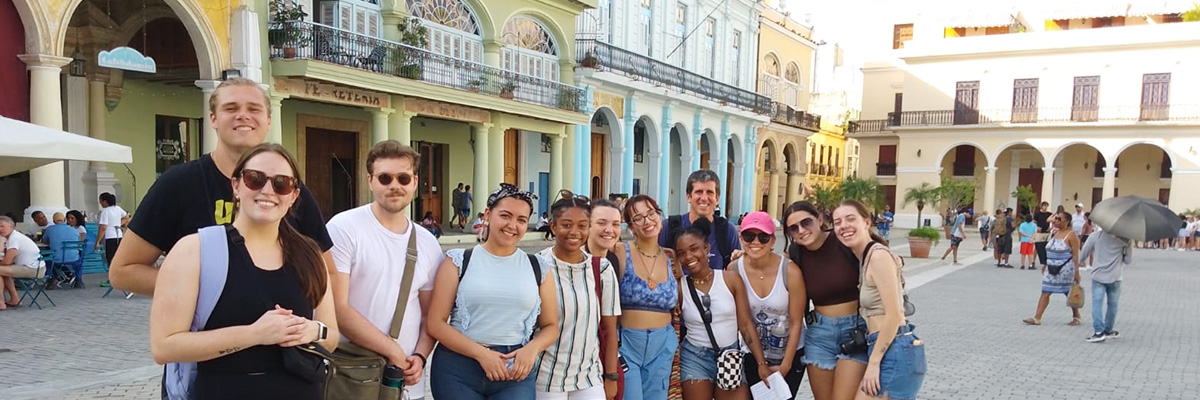La Habana Courses – 2024 Summer Session II
Studying abroad can be a more meaningful and invigorating learning experience than at home—both inside and outside of the classroom. You may be more curious and alert than you usually are so use this heightened energy to enhance your studies as well as your cultural and geographical explorations. You may also encounter different teaching styles and course processes; be prepared to adapt and to learn.
Courses
You may take three to four credits. At least one 3-credit course is required each session you are enrolled. Course availability is contingent upon student enrollment and is subject to change.
Click the course title to view course details, description, and availability.
Cuban History, Society, Politics, and Latin American Culture Studies
The following courses are designed to familiarize you with the region and provide a multi-disciplinary perspective to your studies.
- Summer Session IISociology Women's Studies / Gender Studies 300-level 1 credit Taught in English
Women's activism gained strong visibility in the past few years. This movement was enhanced by the power of new technologies and the Internet. This course provides an introduction to gender theory and women movements. Additionally, students will explore the more recent strategies utilized by feminists and women's movements to rally support and fight against gender violence of all kinds. Students will examine how feminists have used the Internet and social networks as a powerful tool to rally support. The interaction with some of the local main characters of this new ways of activism will provide the students with the opportunity to discuss these topics first hand, addressing as well the new forms of 'Internet violence' that emerge as a reaction.
- Summer Session IINutrition 200-level 1 credit Taught in English and Spanish
An introduction to a local cuisine in a hands-on kitchen environment. Authentic preparations of several local dishes will be taught. Correct cooking techniques are emphasized. Readings and lectures on local food customs and traditions will support and contextualize the cooking instruction.
The cuisine functions as an activity that is generated in daily practice and transmitted orally from generation to generation. History is part of civilization and tells about the culture of people. The cuisine is traditional, magic, art, experience, human tenacity and refined technique.
According to some, has to do with the family inheritance, the transmission of knowledge and a sum of traditions. No one is closer to an artist as we would say that a good cook, but there is some talent to which all human beings are not touched with the same grace.
The kitchen, like music, literature and other arts, is part of the cultural treasure of every nation to be missed.
This course has an additional fee
- Summer Session IIDance 100-level 1 credit Taught in Spanish
The objectives of this course are to understand the antecedents of Latin American dance and to learn to perform correctly folkloric dances from Costa Rica as well as the spicier Caribbean salsa rhythms.
- Summer Session II400-level 3 credits Taught in English
Students will explore the socio-political systems and historical context of Cuba and the Caribbean. This course will present contemporary theoretical perspectives that express the complex socio-economic, cultural, and political reality of the area. Students will cover the recurring topics of culture and "race"; daily life; and religion within Cuba and the Caribbean. This course will analyze ways in which these themes are common to other Latin American colonial societies. Students will draw upon the works and anthropological thinking of Fernando Ortiz; Jean Price-Mars; and C.L.R. James. The goal of this course is to provide a general anthropological overview of Cuba and the Caribbean.
- Summer Session IISpanish 300-level 1 credit Taught in Spanish
A course that complements the development of linguistic skills emphasizing the oral mode of the Spanish language. It aims to improve students' ability to maintain a sustained monologue as well as oral interactions.
Prerequisite: two semesters of college-level Spanish, or equivalent
- Summer Session IICommunity Health Sciences Sociology 300-level 3 credits Taught in English
This course offers an overview of the Cuban health system that operates under the principle that health is an inalienable social right. These services are financed almost exclusively with government resources. The Ministry of Public Health is the governing body of the national health system, which manages resources in the three-tiered healthcare system. The primary tier solves approximately 80% of the population's health problems and its services are mainly provided in polyclinics and doctor's offices and family nurses. Approximately 15% of health problems are covered within the second tier. Its fundamental function is to treat pre-existing conditions to prevent complications and perform immediate rehabilitation. Approximately 5% of health problems are covered within the third tier. Treatments within this tier are related to sequelae or complications with certain diseases. This type of care is mainly provided in specialized hospitals or institutes.
The course will begin with an overview of basic concepts about the Cuban Public Health System. Students will be required to complete readings related to the different primary health care programs before the start of each class and participate in discussions based on the readings. The course will also require students to participate in practical activities that complement the course readings.
Note: The evaluation will be systematic based on oral questions, participation in classes and presentation of reports after practical activities.
Prerequisite: two semesters of college-level Spanish, or equivalent
To request a course syllabus: syllabus@usac.edu
U.S. Visiting Professors
While most USAC courses are taught by local faculty, the following U.S. professor will also teach in this program:
La Habana Summer Session II, 2024
Course: Latin American Social Revolutions
Julia O'Hara, Xavier University.
Dr. Julia O’Hara is Associate Professor of History at Xavier University. Dr. O’Hara teaches courses on Latin American history from pre-Columbian times to the present; Mexican, Brazilian, and Central American history; and gender and sexuality in Latin American history.

